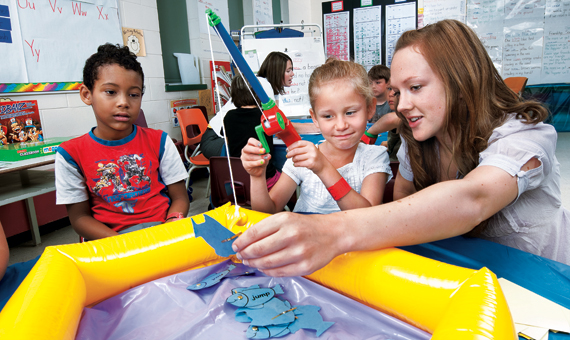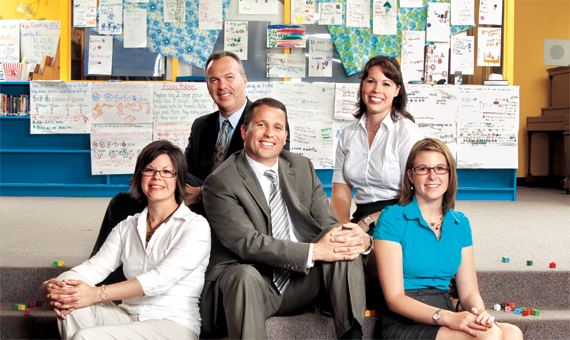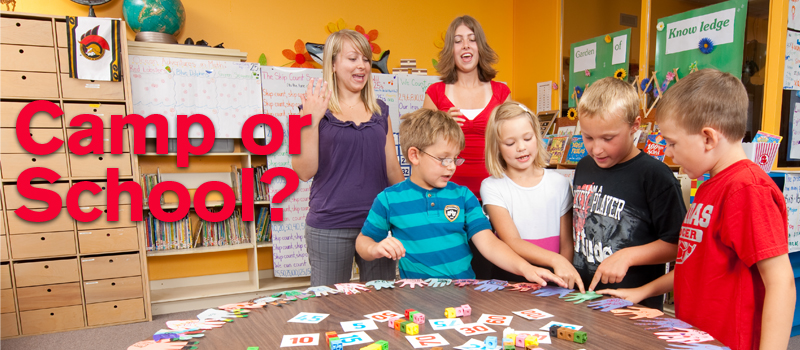Literacy, numeracy and confidence
by Leanne Miller, OCT
Students see Renfrew County’s Booster program as a four-week summer camp full of fun activities and games.
It’s the beginning of July and the weather is sweltering. Just a few days into summer holidays, 170 primary students, 21 teachers, 14 paid student assistants and one principal head back to class at eight Booster sites across the Renfrew County DSB for the fourth term of the school year.
“Don’t call Booster summer school,” says principal Brent McIntyre, OCT. “Kids see it as a four-week summer camp with lots of fun activities and games.”
In reality Booster is a carefully designed program, with an average pupil-teacher ratio of five to one, that incorporates literacy and numeracy activities that boost student achievement.
This is the 20th consecutive summer for the program, and it’s one of the largest turnouts. Throughout the school year, principals and classroom teachers across the board’s 23 elementary schools identify Grade 1 and 2 students who are struggling, primarily with literacy but also numeracy.
“Our main goal is boosting students’ reading levels,” explains Trista Baker, OCT, one of the three teacher liaisons responsible for the program.
Maria Manwell, OCT, another liaison, explains that a child reading at grade level will be at level 16 by the end of Grade 1 and at level 22 by the end of Grade 2.
Renfrew County teachers, like those in at least 70 per cent of schools around the province, identify and track students’ reading levels using Nelson Education’s PM Benchmark reading assessment resource.
The children attending Booster are typically reading below grade level.
“Some of our six- and seven-year-olds are starting to feel negative about school. Our Booster teachers are determined to hook them back in, make them academically successful and show them that learning and school are fun,” says Baker.
The program does feel like camp. Parents, grandparents or older siblings drop off children at 8:30 a.m. and pick them up by 12:30 p.m.. Each week takes on a new theme and each day begins with a whole-group activity, such as a singsong around a make-believe campfire. The children experience rigorous small-group and one-on-one activities such as shared and guided reading, sight-word activities and journal writing.
Baker explains that one-on-one guided reading is the most significant daily component of Booster because of its impact on students’ academic progress and its ability to build students’ self-confidence and self-efficacy as literacy learners. Children read books one-on-one with an adult each day, getting support and feedback from a teacher, or from a trained, college- or university-student assistant, on what they are doing well and what they need to practise.
And the students see their own progress almost immediately, Baker says. “The experience of ‘yesterday I couldn’t read that book and today I can’ is fantastically motivating for children who have struggled to read during the regular school year. They go home excited and wanting to read more books that afternoon or evening with a parent. It’s instant success, and that’s one reason our program is so effective. The kids see they are making huge progress very quickly.”
Guided reading helps the 21 Booster teachers create learning environments that allow their students to take risks and benefit from immediate feedback. They also allow teachers to confer with students individually, collect a variety of data, track student progress and create instant student profiles to help inform instruction.
“The one-on-one opportunities that guided reading provides are invaluable in creating literacy-learning partnerships between students and teachers,” Baker says.
Thanks to the small-group setting that guided reading provides, teachers are able to witness those “Aha!” moments when students get it.
“Being right there when a student finally masters a sight word he has been struggling with or when she fluently reads a short passage for the first time,” Baker says, “is the most rewarding feeling a teacher can experience.”
My son has never liked school. But he smiles when he knows he is going to Booster and he asks me not to pick him up early.
Booster is intense academically but it’s all about fun and games, explains Jody Alexander, OCT, the third teacher liaison. “The children do not realize how hard they are working,” she says.
One Pembroke parent says, “My child’s reading skills are continuously improving as opposed to deteriorating over summer holiday break. My child never complains of having to go to the Booster program, which means he must be enjoying it.
Another parent says, “My son has never liked school. But he smiles when he knows he is going to Booster and asks me not to pick him up early. This in itself has made me happy. He is learning and he doesn’t know it.”
The program
The liaison teachers design the program each year to incorporate engaging, motivational and purposeful play. Board-wide consistency is critical, so the programs are the same at each of the eight site schools – in Deep River, Petawawa, Pembroke, Eganville, Killaloe, Cobden, Renfrew and Arnprior.
Alexander describes two of the most popular sight-word games.
In the crash game students collect cards with sight words on them. If they correctly read a word, they keep that card. When students pick a crash card, they must return all their collected cards to the pile. The student with the most cards at the end of the game wins.
Another popular game is sight-word fishing, where each child takes a turn with the fishing rod and pulls a sight word out of the word pond. The child must call out the word he or she catches.

Children call out the word on their catch when sight-word fishing.
The students love these games, especially the boys, which is important since they comprise about 60 per cent of students this summer.
“Not only are these games fun and engaging for the students,” Alexander says, “they’re also a great way for teachers to quickly assess and track whether the children are learning new words, mastering old words and processing new content as quickly as they should be. The kids love the games; they can’t wait to get that rod and go fishing.”
It’s not just about literacy at Booster. The children also participate in physical fitness activities and work on improving their social skills through structured character-education exercises. They learn the importance of waiting their turn and sharing that fishing rod, for example, and being patient and enjoying watching their classmates succeed.
“Many of our students have struggled academically and are sometimes reluctant to participate in classroom activities,” explains principal McIntyre.
“It doesn’t take long for them all to shine,” he adds. “They gain academically, but there’s an equally important social gain as their self-confidence and sense of place are boosted. And it carries over to the new school year as well.”
The spiderweb activity, a character-education exercise, is used for reflection at the end of an activity, at the end of the day, or on the first or second day of the program to learn everyone’s name. The students sit or stand in a circle. The teacher holds a large ball of yarn and says something positive about the activity, the day or a student. Then, holding onto the end of the yarn, the teacher tosses or rolls the ball to the next person, saying that person’s name, who then says something positive about someone else, unravels some yarn and tosses or rolls it to that person. Students comment and toss the yarn back and forth until everyone has had at least one turn. This creates a web of yarn connecting the whole group. Students develop confidence in each other, learn classmates’ names and learn to be positive about others.

Games, like Spiderweb, teach students the importance of being patient and enjoying their classmates’ success.
It doesn’t take long for them all to shine. They gain academically, but there’s an equally important social gain.
Baker stresses the importance of the program’s data-focused approach, which enables teachers to gather precise data on each child and provide appropriate literacy-strengthening activities.
Students are grouped according to skills, not just the level at which they are reading. A child reading at level 4 might be paired with another reading at level 20 if they both struggle with word endings, vowel sounds or reading for meaning.
Baker explains that the teachers track all the words their students know and focus instruction precisely on which sight words to target.
“That’s one of the benefits of our small pupil-teacher ratio,” she says. “It also allows for targeted student groupings and focused intervention – purposeful play.”
Manwell adds that the children discover they love reading and most keep reading all summer. Each of the eight sites has a variety of books the children can take home for daily and weekend reading. “The world of books is suddenly open to them and they embrace it,” she says.
McIntyre reports that almost all the children finished this summer’s Booster program reading at a PM level higher than when they arrived. Typically they improved one to two reading levels, maintained that throughout August and kept improving in September. This year one child improved six levels. Even those few who did not increase their PM level had other improvements.
“Every child was successful,” McIntyre says, “thanks to the tremendous efforts, collaboration and professional partnerships among our teachers, student assistants and teacher liaisons.”
Many children finished their second year of Booster reading beyond grade-level expectations.
“One student from Deep River,” says McIntyre, “entered year one of Booster reading at level 6 – that’s 10 levels below grade level. This year, after her second year of Booster, she exited reading at a PM of 27 – five levels above the grade-level expectation.”

From left: Jody Alexander; Renfew County DSB Director of Education Roger Clarke, OCT; Booster principal Brent McIntyre; Maria Manwell; and Trista Baker – Alexander, Manwell and Baker are the three teacher liaisons responsible for Renfrew’s Booster program.
Numeracy boost too
Although literacy has been the focus of Booster for many years, numeracy is now getting more attention.
After recess and a snack, teachers lead students through problem-solving activities and work to strengthen counting skills through games and activities.
The children themselves see their progress.
A Grade 1 student from the Petawawa site says, “I learned to count by twos and fives and 25s all the way up to 100! Before it was very hard and confusing and I always got stuck, but now after Booster I don’t get stuck.”
A Grade 2 student at Pembroke in his second year of Booster says, “I learned how to count by 10s and 25s. At first when I went to school, sometimes I’d know and sometimes I would forget, but now I keep remembering.”
A Pembroke parent remarks, “I have found a big change in my daughter since she started Booster. She is not complaining about math, which was her biggest problem at school. You have definitely boosted her confidence – she had pretty much none when school was done this year. I think it’s so wonderful what you do and would recommend it to anyone. I feel that a lot of children would benefit from it even if they’re not struggling in school, because it builds self-confidence and so many children are lacking that.
